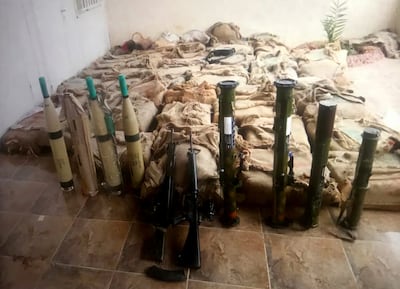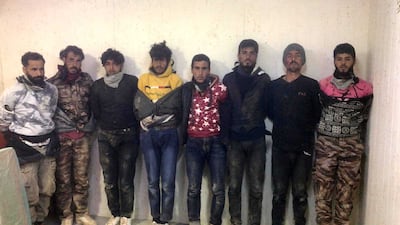Live updates: Follow the latest news on Israel-Gaza
A drug war on Jordan's border with Syria has intensified after hundreds of smugglers and militants transporting narcotics and weapons tried this week to overrun the kingdom's frontier defences.
The attack by 220 gunmen on Monday was marked by its size, the smuggler's possession of advanced weapons, and direct participation by a militia linked to the Lebanese militant group Hezbollah, security officials and members of the Syrian opposition to President Bashar Al Assad said.
The militia, comprising dozens of Bedouins from the Hamat desert area in south Syria, provided heavy machinegun cover for smugglers in four-wheel drive lorries, who carried drugs, anti-personnel mines, thermal mine detectors, explosives and anti-tank missiles, the sources told The National.
A European security official said the weapons appeared to be intended for smugglers on the Jordanian side of the border to be used against the military or for “a latent purpose”, such as attacks on Israel, with which Jordan shares a 480-kilometre border.
The Jordanian army described the operation, in which nine smugglers were arrested and several Jordanians soldier wounded, as “targeting national security”.
The military did not give further details.

The security sources said that the battle with the Jordanian military occurred in the area of Wadi Al Samman, south-east of the Syrian city of Suweida, on the border with the Jordanian governorate of Mafraq.
They said the militia that was involved is led by Khalaf Al Jumaili and was formed by Hezbollah to protect hashish supplies sourced from Lebanon, and Captagon amphetamine pills produced in areas south of Damascus.
The attack prompted Jordan's most intensive air strikes in Syria since the kingdom's air force this year started targeting drug cartels linked to Hezbollah in the south of the country, the sources said.
Jordanian strikes hit seven targets, among them storage facilities and farms, in the southern Suweida and Deraa governorates on the border with Jordan, they said.
The National reached out to Hezbollah for a comment but it did not respond.
The group has previously denied any role in the narcotics trade, which has also affected Saudi Arabia, its most lucrative market.
Weapons smuggling
Since the Hamas-Israel war started on October 7, the military has deployed more rapid-response units to the frontier with Syria, said the European official, who is in contact with the Jordanian authorities.
The purpose is to prevent infiltration by Iranian-aligned militants into the kingdom, as well as weapons supplies that could reach home-grown militants, who could attack Israel in support of Hamas, he said.
“One of the shortest ways to reach Israel from Syria is through Jordan,” the European official said. “I think the Jordanians are aware that Iran might have become keen build up capabilities in Jordan.”
In 1994, Jordan signed a formal peace treaty with Israel, becoming the only Arab country to do so after Egypt. The kingdom also has a defence pact with Washington, the largest donor to the kingdom and the main sponsor of upgraded defences in recent years on the border with Syria.
Both Hamas and Hezbollah are supported by Tehran, which has consolidated its control over parts of Syria in the last eight years of the civil war. Its tools have been mainly Lebanese and Iraqi militias, but it has also formed local armed groups.
The Islamic Revolutionary Guard Corps, which supervises Iran's clients and other armed allies abroad, has threatened to unleash multipronged attacks on Israel since October 7.

'Rules have changed'
An Arab security official said Monday's attack shows that the “rules have changed” on the Jordan-Syria border.
He said that armed groups supported by Iran have transformed from playing a “back seat” role, mainly providing supervision and reconnaissance to smugglers, to engaging in active combat.
Hezbollah moved to areas close to the border with Jordan after a deal in 2018 between Russia, the US and Israel to hand over the area from anti-Assad rebels to the Syrian regime's military.
The deal was part of an alignment of zones of control in Syria after the Russian intervention in 2015.
Since the 2018 deal, Syria's border with Jordan has become an important route for the trafficking of narcotics.


